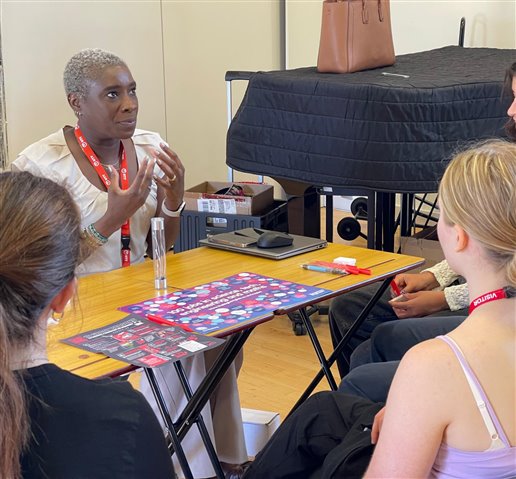Being an IET Education Volunteer can be busy, fun, and educational for more reasons than you think, says Karyn Sansom, IET Education Volunteer...
I'm Karyn Sansom and I am an IET Education Volunteer, something I have been doing for the last six years.
As an IET volunteer, I help promote a better understanding of engineers and the vital contribution engineering makes to society for young people aged 4-19.
My Role as a Volunteer
 My work involves includes attending career and science fairs, engaging with students, parents, carers, and teachers. I distribute engineering leaflets covering topics such as career paths in Engineering and demystifying the various types of engineering disciplines.
My work involves includes attending career and science fairs, engaging with students, parents, carers, and teachers. I distribute engineering leaflets covering topics such as career paths in Engineering and demystifying the various types of engineering disciplines.
Alongside that, I lead hands-on activities, encouraging students to apply their classroom science knowledge to small engineering challenges. Additionally, at school events I often speak on 'Women in Engineering,’ sharing insights from my career and participating in Q&A sessions. I support challenge events such as Go Construct K'NEX, led by STEMPOINT, as well as local, regional, and national Big Bang Fairs, where I assist with engagement activities or serve as a competition judge.
In other capacities, I support skill-building activities related to CV writing, personal statements and interview techniques including mock interviews. I also serve as a Trustee for a special educational needs (SEN) school. However, my most cherished role is mentoring students, either through year-long programmes or short-term periods of around three months.
Preparation For the Day Ahead
Preparation is key for any event. I ensure that all necessary equipment and leaflets are ordered at least three weeks in advance. The day before an event, I pack all materials into my car to save time in the morning. For larger events, I coordinate with fellow volunteers for support. Some events also require specific forms to be filled out, as dictated by the organisers.
On the Day
A typical volunteering day for a school science fair starts early. A hearty breakfast is essential because these events can be long and have few breaks. Before heading out, I double- and triple-check that all materials—posters, tablecloths, and leaflets—are packed and ready to go.
I aim to arrive at the venue at least 20 minutes before setup time, allowing for traffic or any unforeseen circumstances. After meeting the organiser, I set up my stall, which includes arranging an area for activities and displaying the leaflets. Once the event kicks off, it's all systems go—engaging with students, teachers, and parents throughout the day, and sometimes taking a few moments to visit other stalls to familiarise myself with who else is supporting the event.
Since these events involve a lot of speaking, staying hydrated is crucial. I interact with volunteers from other organisations and businesses, and this networking often provides opportunities for future collaboration.
Volunteering: Challenges and Achievements
Volunteering with the IET has given me the chance to work with various groups and organisations, including:
- The STEM Ambassador Network
- MCR Pathways
- Stemette
- WISE (Women in Science and Engineering)
- Inspiring the Future
- Primary & Secondary Engineer
The biggest challenge I face is running events alone, particularly large fairs or school-wide events, where it’s hard to find time for a proper break. Another challenge is balancing time to meet every request for volunteer support.
My greatest achievement, however, was mentoring a young person through a competition that she won, which led to a university scholarship. Attending university had previously seemed like an unattainable dream for her, so being part of that journey was incredibly rewarding.
Adding Skills
To be effective in my volunteering role, I have pursued training in several areas. I am certified in Mental Health First Aid, Equality, Diversity and Inclusion and Neurodiversity. Along the way, I’ve also honed my personal skills, such as empathy and authenticity. One of the most valuable skills I’ve developed is active listening, which has been essential in building strong relationships with the students I mentor.
Training
As a trustee, I have received specific training for that role. I’ve also completed standard training for working with schools or young people, including Safeguarding, Prevent Duty, and GDPR. Additionally, my leadership and management training, gained through my professional work, has helped refine my transferable skills in volunteering.
Self-Knowledge and Improvement
Balancing volunteering with work and family commitments is certainly a challenge, but
careful planning and clear communication with those around me make it possible. Through this experience, I’ve learned that my natural traits align well with mentoring, and being authentic helps me build relationships quickly with the students I work with.
Volunteering has also taught me the importance of embracing feedback. It has shifted my focus from striving for perfection to valuing progress. The only thing I would change about my role is the ability to volunteer full-time, so I could support every request for help that comes my way.
One More Thing
Volunteering requires time and commitment, but the impact you make lasts a lifetime. It's important to choose the right opportunity, ensuring it aligns with your interests and that you feel competent in the role. Flexibility is key, as is the ability to build relationships and take time for reflection. Always seek feedback, enjoy the journey, and most importantly, have fun!
#lifeofanengineer